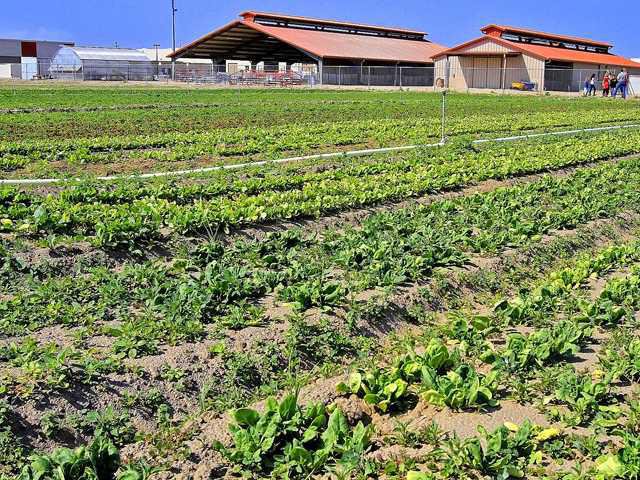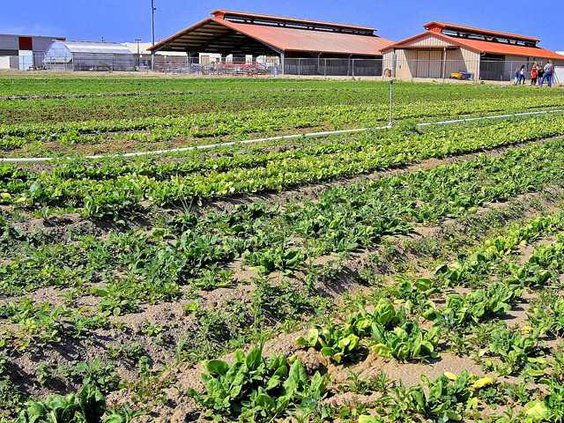Jason Messer can see the future of California agriculture simply by gazing northward from his third story corner office at the Manteca Unified School District office complex on Louise Avenue just west of Airport Way.
“Manteca Unified is serious about training students for (economic) success,” the district superintendent said.
Below him is the school farm. But unlike many other school ag programs, the Manteca United school farm goes way beyond just raising animal projects.
uStudents have teamed with private sector and higher education researchers to test the effectiveness of using biochar supplements on four test plots designed to measure how effective it is in reducing water use, increasing water retention, and increasing crop production as a long-term solution to California’s water crisis.
uVeggie Express has created employment opportunities for nine students and one grounds worker. The program produces 20,000 pounds of produce that are served in the district’s school cafeterias. Students are able to experience growing different crops such as black green beans, orange honeydew, and watermelon radishes in addition to traditional crops. Crop production is expected to increase by 40 percent in the 2016-17 school year.
uA greenhouse program produces more than 200 pounds of basil a year that goes into making fresh pesto used in several school lunch recipes. The greenhouse is working on hydroponic planting methods. In addition drought tolerant trees and shrubs are being propagated for Manteca Unified grounds crews to further reduce expenses and save water.
uA California Specialty Crop grants dubbed “The Importance of Bees!” has been received. It will allow 10 more students to be hired after winter break. It includes a partnership with CSU Stanislaus with an intern participating in grant activities. The colonization of bees will allow the MUSD school farm to pollinate its almond orchards without an added expense. Honey will be pasteurized to be used in school lunch menus.
“It makes sense to educate students to be more productive farmers,” Messer said.
The school farm — as well as other vocational skill training programs — are expanding and adjusting to meet future job demand at the same time the district is moving forward with its Going Digital initiative. They are all intertwined in the district’s effort to prepare students to compete in the world beyond San Joaquin County as well as to have the foundation needed to pursue employment in jobs available in the immediate region.
Not only is the agriculture sector at $54 billion in crop production from 71,400 farms the state’s leading industry but it is a source of almost 450,000 direct jobs on farms. That doesn’t include jobs in support industries such as trucking and manufacturing.
Almost half of the nation’s vegetables, fruits, and nuts are produced in California. The state has more than 50 consecutive years as being the top ag state in the nation.
Besides that, San Joaquin County is the nation’s seventh most productive county in terms of agricultural products.
Students participate in co-op programs at the school farm such as sheep, goat, rabbit, beef, and Serama Chicken programs. Teachers serve as advisors while students (about 30 per co-op) take care of the animals every day ranging from watering and feeding to even major medical treatments. That is in addition to FFA projects that include turkeys, pigs, sheep, goats, chickens and rabbits.
There are 90 students involved with the school farm during the year. That number doubles in the spring through the co-op programs.
The school farm partners with Give Every Child a Chance, UC Master Gardeners, Stanislaus Ag Advisory and Manteca Unified school gardens.
School farm: Growing success
Everything from biochar project to honey production





